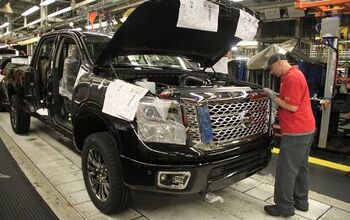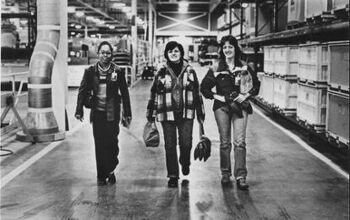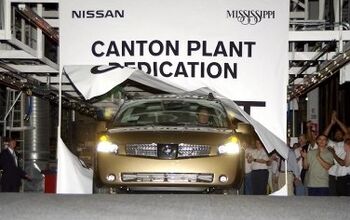UAW Not Welcome In The South

“I see no need for union representation,” says Adrian Leslie, line worker at Volkswagen’s Chattanooga plant. “We are being treated fairly here.”
If it would be him alone to decide, then any plans of the UAW to unionize Volkswagen Chattanooga are doomed. Leslie is not alone in his opinion, and the plans are doomed.
Leslie had given up a 7 ½ year job at a distribution company in Chattanooga, because “the job I had before was considered a job, but I was actually looking for was a career.” He is 1 ½ year into his career at Volkswagen and thinks that “the working conditions here are excellent. This company is going a long way.”
Colleague Kristy Hill, who is fitting suspensions of the new Passat with Leslie, would be a tough target for union organizers: ”I haven’t heard a lot about the unions, I’d have to make a lot of research before I would make a decision,” says the resolute lady who held part time jobs before she was hired by Volkswagen 1 ½ years ago. “I love it,” Ms. Hill says. “This is it – this will be my last job.”
The two, randomly interviewed at our visit to Volkswagen’s Chattanooga plant, echo the sentiment at the bright, airy and clean Volkswagen plant in a wooded valley in the outskirts of Chattanooga. When the two signed on 1 ½ years ago, they were paid $14.50 per hour, even during training. Now they are on their way to $19.50 per hour. A Detroit tier two UAW worker makes $15.50 per hour at Ford. After the labor deal with the UAW, the tier two wage will rise to $19.28, the same as at GM.
After 36 months at Volkswagen, the hourly wage does not only exceed the future tier two wage in Detroit. There is additional shift pay, there are quarterly performance bonuses, a choice of medical plans, and a host of other benefits. Visits to the on-site doctor are free, a gym is open 24/7. A company lease program is so attractive that half of the cars on the employee parking lot are already Volkswagens, coexisting in harmony with Detroit iron.
In July, UAW President Bob King said that organizing foreign auto plants is a matter of life and death of the union. Without a union victory in the south, “I don’t think there’s a long-term future for the UAW, I really don’t,” said King.
After touring transplant plants in the south, we predict that any forays by the UAW will get bogged down in the red mud of Dixie. If it indeed is a matter of life and death as advertised, then the UAW is dead.
Southern workers seem to be largely ambivalent towards the UAW. The management of southern transplants usually does not speak out against the UAW as openly as Honda did. It does not have to, the words and actions of the workers speak for themselves.
The few times the UAW tried to unionize a transplant factory in the south ended in a debacle.
In 2001, Nissan workers in Smyrna rejected U.A.W. representation by a 2-to-1 vote, a result branded as a “devastating defeat” by the World Socialist Website. Back then, the New York Times called the results “no better than in the union’s failed attempt to organize the same plant in 1989.” Now, the entrance to Nissan’s U.S. HQ is guarded by grim polar bears.
The UAW can’t even count on the solidarity of its union brothers in Germany.
A little later after the life and death announcement, the UAW revealed that it had targeted Volkswagen’s Chattanooga plant, and had meetings with the German metal workers union in order to drum up support. Those meetings were not highly successful. Soon thereafter, Bernd Osterloh, head of Volkswagen’s works council who represents labor of VW’s supervisory board, told Reuters he would not actively promote efforts by the United Auto Workers to broaden its membership in Chattanooga.

Bertel Schmitt comes back to journalism after taking a 35 year break in advertising and marketing. He ran and owned advertising agencies in Duesseldorf, Germany, and New York City. Volkswagen A.G. was Bertel's most important corporate account. Schmitt's advertising and marketing career touched many corners of the industry with a special focus on automotive products and services. Since 2004, he lives in Japan and China with his wife <a href="http://www.tomokoandbertel.com"> Tomoko </a>. Bertel Schmitt is a founding board member of the <a href="http://www.offshoresuperseries.com"> Offshore Super Series </a>, an American offshore powerboat racing organization. He is co-owner of the racing team Typhoon.
More by Bertel Schmitt
Latest Car Reviews
Read moreLatest Product Reviews
Read moreRecent Comments
- Theflyersfan I think color is FINALLY starting to return to car lots. After what seems like over a lost decade of nothing but shades of gray, whites, and black, I'm seeing a lot more reds and blues creeping into luxury car lots. Except Audi and Volvo. They still have at least 6-8 shades of gray/silver. But they at least have a nice green. Honda and Acura seem to have a bunch of new colors. And all carmakers need to take a serious look at the shades of red seen at the Alfa Romeo lot and tell themselves they want that because that looks amazing.
- Bd2 Well, it's no Sonata, no does it have the panache of the Optima.
- Teddyc73 "eye-searingly"?
- Teddyc73 I applaud anyone who purchases a vibrant, distinct or less popular color. We need these people. Our road ways have turned into a dreary gloomy sea of white, black, silver and greys, most with the equally lifeless black wheels. Mr Healey is guilty of contributing to this gloom apparently. It looks like a black and white movie across the nation when grouped with our grey houses with grey interiors. Totally dull and lifeless. And what is with this awful hideous trend of dull grey with black wheels showing up everywhere? It's on everything. Just awful. Come on people! I'll keep my Ram 1500 with it's deep rich sparkling Western Brown paint as long as I can.
- Shipwright As my Avatar shows I had an '08 GT 500, Grabber Orange convertible. I now own a '12 GT 500 Kona Blue coupe.







































Comments
Join the conversation
A simple interview with two happy employees is definitely union bashing. I've worked union & non-union. Both have their disadvantages. Non-union is much more political in the workplace. A do-as-youre-told philosophy applies. Some people land jobs that they are not qualified to perform because they happen to be a friend of the boss. There is nothing to protect you from management unless it's covered by some obscure labor law. Union jobs stress seniority over qualifications. They call it a brotherhood, but in many cases if your job is threatened you can "bump" someone from their position and take their job (strictly due to seniority and a semi-ability to perform the task). The trade union I worked with was essentially a good ol' boys club. Children, friends & relatives of union members received preferential treatment. Outsiders need not apply.
I have purchased nothing but American nameplates from the "Big Three" my entire life, all of which were assembled in either Ohio, Virginia, or Michigan. I've done my part to support these companies and the UAW, but after the 2012 election, I'm done. My future vehicle purchases will be American-assembled vehicles from non-UAW plants, which unfortunately means foreign nameplates. I planned to buy the 2013 Fusion, but only after production started up in Michigan. Not any more. Thanks for screwing up a good thing, UAW. Good riddance - hope you get what you deserve.